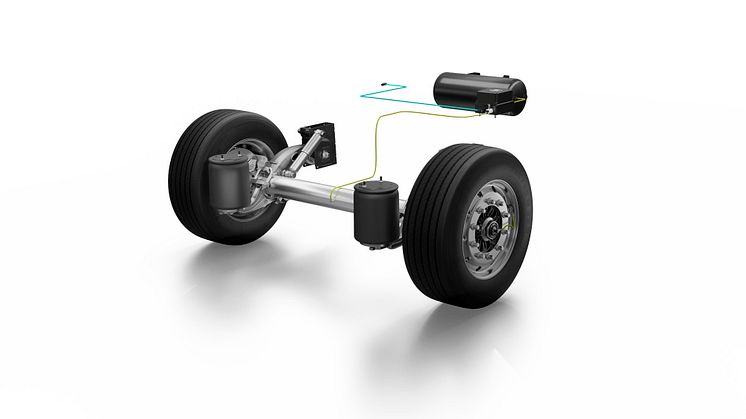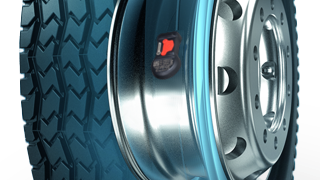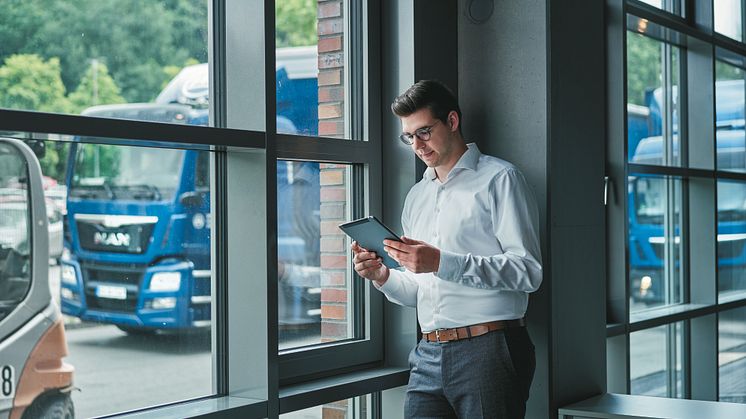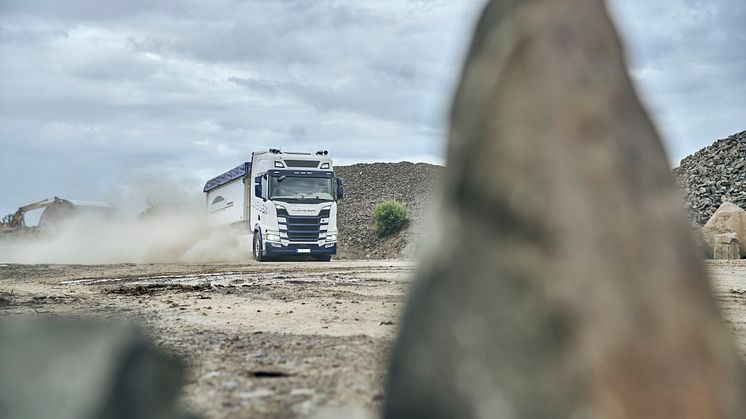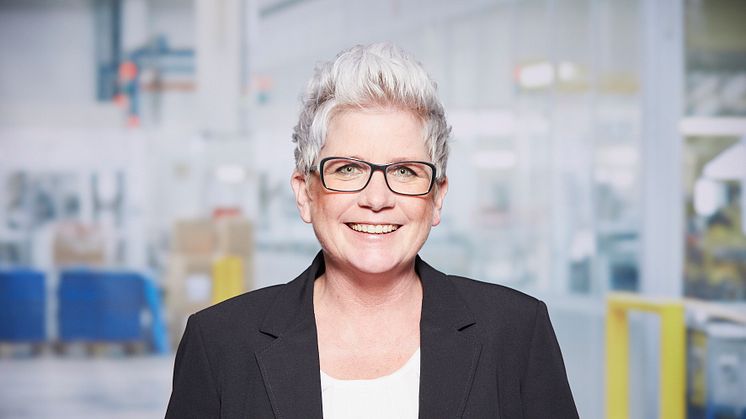
Blog post -
Tyre pressure: monitoring is good, automatic control is better!
New laws and regulations generally impose higher costs and more bureaucracy on transport companies. Everything is different with UN ECE R 141: I will explain how you can save a lot of money and stress with the tyre pressure monitoring and control systems that will be mandatory from July 2024, and which solution is best suited to your fleet.
Margins in the transport sector are getting smaller and smaller. This means anything that tangibly reduces transport costs will relieve the pressure on the transport company's balance sheet. In this context, it is astonishing that in Germany alone, millions of litres of excess diesel are consumed every year in road freight transport, unnecessarily emitting CO2 into the atmosphere, and that vast quantities of tyres wear out prematurely. The main drivers for this are pressure variations in the tyres, which cause a considerable increase in fuel consumption and wear on the trailer. This is not a coincidence, as truck tyres have to take a lot of punishment: constantly changing load weights, road conditions and temperatures quickly lead to pressure variations, causing the tyres to wear out at a rapid pace. This not only increases operating costs, but also the risk of accidents: after all, tyres are the only point of contact between the trailer and the road, and even slight variations in pressure can jeopardise driving stability. A puncture can cause serious accidents that may endanger cargo, the vehicle or other road users. According to ADAC TruckService, most truck accidents are caused by poor maintenance. In accordance with this report, breakdown service staff are called out about 40,000 times per year. According to their own data, punctures are the cause in two thirds of the cases, i.e. 26,400 potentially prematurely worn tyres that can also no longer be retreaded. A new premium-brand trailer tyre easily costs 300 euros and more.
The global standard for tyre pressure
The effects of tyre pressure on costs, safety and the environment have been well studied scientifically. They are so serious that they have prompted the United Nations Economic Council to take action. For this reason, it issued the Standard UN ECE R 141, which will fully come into force after a transitional period from July 2024 and of which every transport company should be aware: for trailers, it prescribes Tyre pressure monitoring systems (TPMS) or automatic Tyre pressure control systems (TPRS). The regulation applies to countries with such different levels of development as South Africa, Germany, Sweden, Australia and Turkey. This explains why the comparatively simple TPMS is just as allowable as automatic pressure equalisation with TPRS. The fleet operator is therefore spoiled for choice! If the aim is purely to comply with the legal standard, the TPMS represents a cost-optimized solution: it must warn the driver of a drawbar trailer within ten minutes if a pressure loss of more than 20 per cent or a malfunction of the system occurs.
How tyre pressure control pays off
However, if you want to avoid unplanned downtime due to loss of tyre pressure, tyre pressure control systems are a suitable solution. Because after all, a warning signal alone does not eliminate the pressure variation. Anyone familiar with the realities of day-to-day transport operations knows that some responsible persons will ignore warnings in the driver's cab in order to meet deadlines. This is why I give the recommendation: monitoring is good, regulation is better.
A tyre pressure control system such as the award-winning AirSave from BPW compensates for a pressure variation of more than five per cent within ten minutes. Fully automatically, without interruption of the transport process. In the event of a puncture, the system pumps powerfully to compensate for the flat tyre – so the driver can safely reach the workshop and avoid unplanned downtimes.

Automatic pressure equalisation with AirSave from BPW
AirSave also reduces the economic burden on fleet operators, here is an example: for a three-axle vehicle with a mileage of 120,000 kilometres per year and an average pressure deviation of 10 per cent, the system delivers a cost benefit of 700 euros per year – solely as a result of the fuel savings (around 250 litres) and the longer service life of the tyres. Every vehicle operator can use our Cost-effectiveness calculator online to work out how quickly the purchase will pay for itself – usually within the first year of operation**. Companies that can also obtain government subsidies from support programmes will find themselves on the road even more quickly and profitably. Our advice: anyone thinking about ordering a new trailer should include AirSave in the order.
TPMS and TPRS for existing vehicles
But what about existing vehicles? AirSave will also be available as a retrofit solution from the end of 2024. Retrofitting AirSave is especially worthwhile for trailers with particularly valuable superstructures such as tank silo vehicles or vehicles for transporting hazardous goods. For large fleets with more than 200 vehicles, a combination of AirSave and telematics is practically indispensable: the savings in terms of economy, time and organisation effort cannot be disregarded by any business-minded fleet operator.
Depending on the mileage and intended use of the vehicle, you can also make a conscious decision to only meet the legal requirements and opt for a simple tyre pressure monitoring system. This is why the BPW Group offers the idem TPMS, a competitively-priced tyre pressure monitoring solution with rim or valve sensor that complies with all UN-ECE regulations. The idem TPMS solution can also be used as a telematics system, making interconnectivity of the vehicle very easy.This means that the fleet manager and/or dispatcher are always aware of the tyre conditions. With the "Smart TPMS" entry-level function, idem TPMS warns the driver and sends an e-mail to the office or service center at the same time - even without a telematics portal. These solutions can be easily retrofitted to existing vehicles without the need for special tools.

Tyre pressure montoring system from the BPW Group: idem TPMS
So simple tyre pressure monitoring systems have their place in the market. Nevertheless, it is to be expected that automatic tyre pressure regulation using intelligent TPR systems such as AirSave will soon become the standard in the transport industry due to the many additional benefits, such as the avoidance of unplanned downtimes.
Environmental and climate-friendliness convinces
The vehicle operator can also impress its customers with its environmental and climate friendliness: a three-axle vehicle with AirSave saves the environment from unnecessary additional diesel consumption in the event of pressure variations and hence around 655 kilograms of CO2 per year – and the verges of the motorway from the remains of burst tyres. Total failure of a tyre also requires energy-intensive new production, which generates around 300 kilograms of CO2 per tyre. Based on the number of punctures, this corresponds to 7,920 tonnes of additional CO2 emissions for the operational area of ADAC TruckService alone. Even if a tyre blowout does not occur, TPMS and TPRS help the vehicle operator to get maximum mileage out of the tyre. This also saves CO2 and money. This means that tyre pressure monitoring systems and tyre pressure control systems are efficient cost brakes, effective means of climate protection and safety systems all at the same time.
Find out more and seek advice now
The table below gives you an initial overview of the BPW Group's TPM and TPR systems. In addition, BPW also offers a Online amortisation calculator, which shows vehicle operators the savings effect of the AirSave system for their fleet individually according to mileage, axles and other factors. The BPW sales team is available to provide personal advice. Find out now and your transportation operations will soon not only be legally compliant, but also safer and more economical than ever.
At a glance: comparison between TPMS and TPRS systems from the BPW Group
idem TPMS/BPW TireMonitor | BPW AirSave | |
Savings potential diesel/CO2 | 248 l/660 kg* | 248 l/660 kg* |
ROI** | < 1 year ** | < 1 year ** |
ADR approval | yes | yes |
effective in VECTO | no | no |
Error message | yes | yes |
automatic air refill | no | yes |
Accuracy | +/- 0.3 bar | -0.2 bar |
Setpoint pressure adjustable | yes | yes |
Warning upon threshold value exceedance | yes, in the cabin, via telematics and driver app | yes, via exterior lamp, in the cabin |
Identification of the affected wheel | yes | no |
Service requirement | requires little maintenance | requires little maintenance |
Signal transmission | CAN bus, radio | CAN bus |
Installation ex works | yes | yes |
Retrofit | yes | yes, via Service organisation *** |
Tyre change | yes | yes |
Installation time | 35 minutes for entire system in three-axle trailer | 60-90 minutes for entire system in three-axle trailer |
Availability | Independent of axle type for tyre pressure up to 12 bar and a wide range of rim sizes (15'', 17.5'', 19.5'', 22.5'', 24.5'') | Axles from 9 to 12 t incl. 9 t self-steering axles, swing axles, stub axles, Low loader axles |
Combination with aluminium hub | yes | yes |
Warranty | 2 years | 2 years |
Connection of fleet telematics | yes | optionally available |
Connection of driver app | yes | optionally available |
*based on a mileage of 120,000 km per vehicle per year and an average pressure variation of ten per cent
**dependent on list price of vehicle manufacturer and possible funding
***expected from 4th quarter of 2024


